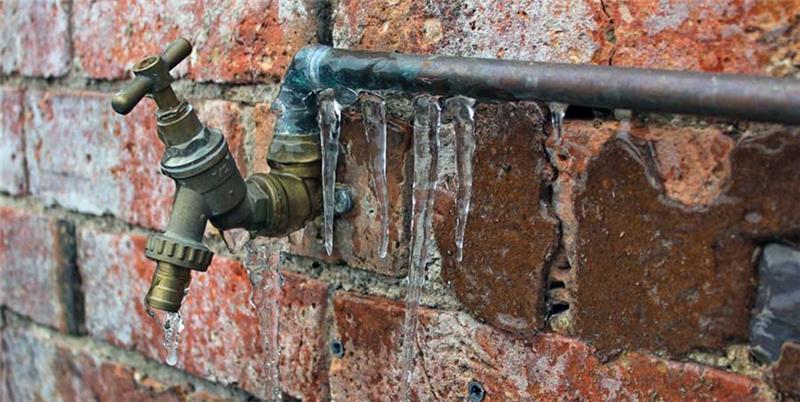Frozen Water Pipes Guide
Ensuring your business is prepared for colder weather could save you thousands. Remember, providing regular meter reads (at least monthly) can protect you from shock bills!
Water inside exposed pipes and taps can freeze. When water turns to ice, it expands. This can cause pipes to burst or stretch creating damage and leaks when it gets warmer.
Preparing for the Winter Months

Identifying your water pipes
Before protecting any water pipes from the weather, you should check which ones carry water. You can do this by running the water and if the pipe vibrates, then it’s a water pipe.
Avoid Frozen or Burst Pipes
To help ensure your premises’ pipes do not freeze or burst with the cold winter weather, follow our top tips to avoid frozen or burst pipes:
- Insulate water tanks and lag pipes (pipe insulation or ‘lagging’ material can be found in most DIY stores), and make sure there are no gaps at bends, valves or fittings.
- Insulate taps. When a tap is frozen it can increase the risk of a burst pipe. When covered, the risk of freezing is reduced. Outdoor tap covers should be available at your local DIY store. Don’t forget to lag the pipes leading up to the tap too!
- Protect your water meter by ensuring that its cap/ polystyrene plug is still in place. If waterlogged, buried, lost or broken, please let us know as soon as possible, so that we can raise a repair request with your wholesaler.
- Fix dripping taps – get a plumber in or fix it yourself if you can. To find out how to do a self-leak test, check this post
- Check the boiler has been serviced
- Minimise draughts from outside by using insulation, wood or plastic and close doors and windows to unheated parts of the property.
- Keep your heating on low or turn off the water at the stopcock over any period where the premises is unattended and drain down the system so there’s no water left in the pipes. This will ensure you don’t return to a flooded premises!
- Keep a separate supply of drinking water for emergencies
- Clear gutters of leaves and debris, to prevent them from flooding
There’s no water coming through the tap, now what?
Ask your neighbours if they have water. If they’re also unable to run water, there may be a supply interruption in your area. In this case, you'll need to contact your wholesaler.
If your neighbours do have running water, then it’s likely your pipes have frozen.
What to do if a pipe within your site boundary does freeze
1. Turn off the water supply at the stopcock
Most are fitted under the sink. Close by turning clockwise. Any problems, get in touch on 0330 6600 137
2. Open all the taps
In order to reduce flooding and prevent pipes refreezing once thawed
3. Thaw the frozen pipes
By applying a soft heat - e.g. a hot towel. To prevent any damage or crack occurring make sure you move the heat source along the pipe.
4. Soak up or block off escaping water
This can be done with towels
6. Turn off taps once pipework is repaired
To avoid further flooding
.
If you notice an issue with a pipe outside your site boundary, such as a burst, you should contact your wholesaler directly and they will be able to help
Get in touch!
If you want to find out more about how to reduce your water consumption and bills, get in touch with our environmental team.